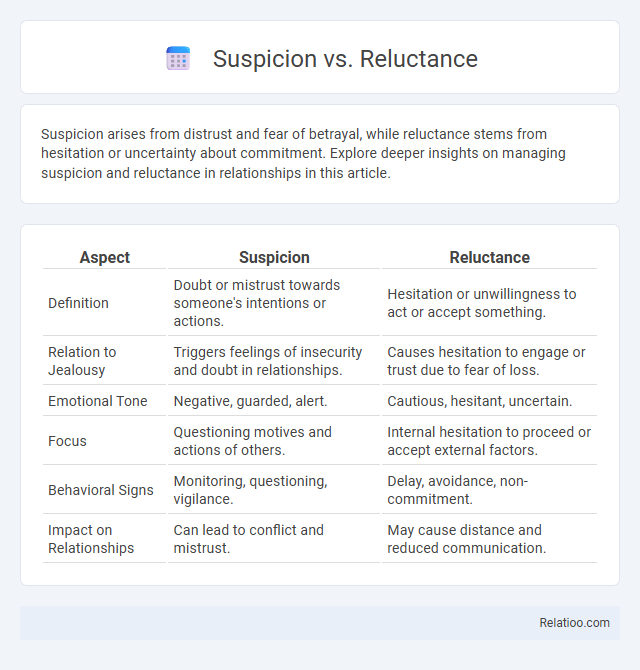Suspicion arises from distrust and fear of betrayal, while reluctance stems from hesitation or uncertainty about commitment. Explore deeper insights on managing suspicion and reluctance in relationships in this article.
Table of Comparison
| Aspect | Suspicion | Reluctance |
|---|---|---|
| Definition | Doubt or mistrust towards someone's intentions or actions. | Hesitation or unwillingness to act or accept something. |
| Relation to Jealousy | Triggers feelings of insecurity and doubt in relationships. | Causes hesitation to engage or trust due to fear of loss. |
| Emotional Tone | Negative, guarded, alert. | Cautious, hesitant, uncertain. |
| Focus | Questioning motives and actions of others. | Internal hesitation to proceed or accept external factors. |
| Behavioral Signs | Monitoring, questioning, vigilance. | Delay, avoidance, non-commitment. |
| Impact on Relationships | Can lead to conflict and mistrust. | May cause distance and reduced communication. |
Understanding Suspicion: Definition and Characteristics
Suspicion is a cognitive state marked by doubt or mistrust toward someone's intentions or actions, often arising from perceived inconsistencies or lack of evidence. Unlike reluctance, which involves hesitation or unwillingness due to fear or uncertainty, suspicion specifically includes an element of skepticism and the anticipation of potential harm or deceit. Key characteristics of suspicion include alertness to unusual behavior, critical evaluation of ambiguous information, and a tendency toward cautious or defensive responses.
Defining Reluctance: What Sets It Apart?
Reluctance is characterized by a hesitation or unwillingness to engage in a particular action, often driven by uncertainty or fear of possible outcomes. Unlike suspicion, which involves mistrust or doubt about others' intentions, reluctance centers on personal hesitation rather than external judgment. This distinction highlights reluctance as an internal conflict, making it unique in decision-making processes compared to suspicion or outright resistance.
Key Psychological Triggers of Suspicion
Suspicion arises from key psychological triggers such as uncertainty, past negative experiences, and perceived threats, which activate your brain's threat detection system. Unlike reluctance, which is driven by hesitation or lack of motivation, suspicion involves a deeper cognitive process of evaluating potential deceit or harm. Understanding these triggers helps differentiate suspicion from mere hesitation or reluctance, enhancing your ability to respond appropriately in uncertain situations.
Common Causes of Reluctance
Reluctance commonly stems from fear of failure, lack of confidence, or previous negative experiences that condition hesitation. You may encounter reluctance when uncertainty about outcomes generates self-doubt or apprehension to take risks. Understanding these causes helps address barriers and promote a more decisive and proactive mindset.
Behavioral Signs: Suspicion vs Reluctance
Suspicion often manifests as heightened vigilance, guarded body language, and questioning attitudes, indicating an underlying mistrust or doubt toward a person or situation. Reluctance is characterized by hesitation, avoidance behaviors, and minimal engagement, reflecting uncertainty or discomfort without the active distrust seen in suspicion. Your ability to differentiate these behavioral signs can enhance interpersonal understanding and improve communication effectiveness.
Emotional Impact: How Each Response Feels
Suspicion evokes a heightened sense of distrust and vigilance, creating emotional tension and anxiety due to perceived threats or hidden motives. Reluctance generates hesitation and mild discomfort, reflecting internal conflict or uncertainty about engaging in a particular action. Resistance intensifies emotional defiance and determination, often accompanied by frustration or strong opposition to change or influence.
Influence on Decision-Making: Suspicion vs Reluctance
Suspicion often triggers critical scrutiny and cautious behavior, significantly influencing your decision-making by prompting deeper investigation and hesitation due to perceived risk or dishonesty. Reluctance, by contrast, stems from uncertainty or discomfort, causing delays or avoidance but not necessarily suspicion of intent. Understanding the distinction enhances your ability to interpret others' behaviors and make informed decisions based on emotional cues and trust levels.
Suspicion and Reluctance in Relationships
Suspicion in relationships often arises from a lack of trust, causing you to question your partner's intentions or honesty, which can lead to emotional distance and conflict. Reluctance, on the other hand, reflects hesitation or unwillingness to engage fully, often due to fear of vulnerability or past experiences, impacting communication and connection. Understanding the difference between suspicion and reluctance helps address underlying issues and foster healthier, more trusting relationships.
Overcoming Barriers: Building Trust and Openness
Suspicion often stems from doubts about intentions, while reluctance involves hesitation due to fear or uncertainty, and resistance is a stronger form of opposition. Overcoming these barriers requires consistent communication, transparency, and empathy to build trust and encourage openness. Your ability to foster a safe environment where concerns are acknowledged helps transform suspicion and reluctance into collaboration and mutual understanding.
Practical Strategies for Addressing Suspicion and Reluctance
Suspicion often arises from mistrust or past experiences, while reluctance stems from hesitation or uncertainty about change. Practical strategies for addressing suspicion include transparent communication and building trust through consistent actions, whereas overcoming reluctance involves providing clear information, reassurance, and support to reduce fears and encourage commitment. Your approach should tailor these methods to the individual's concerns to effectively foster cooperation and positive engagement.

Infographic: Suspicion vs Reluctance
 relatioo.com
relatioo.com